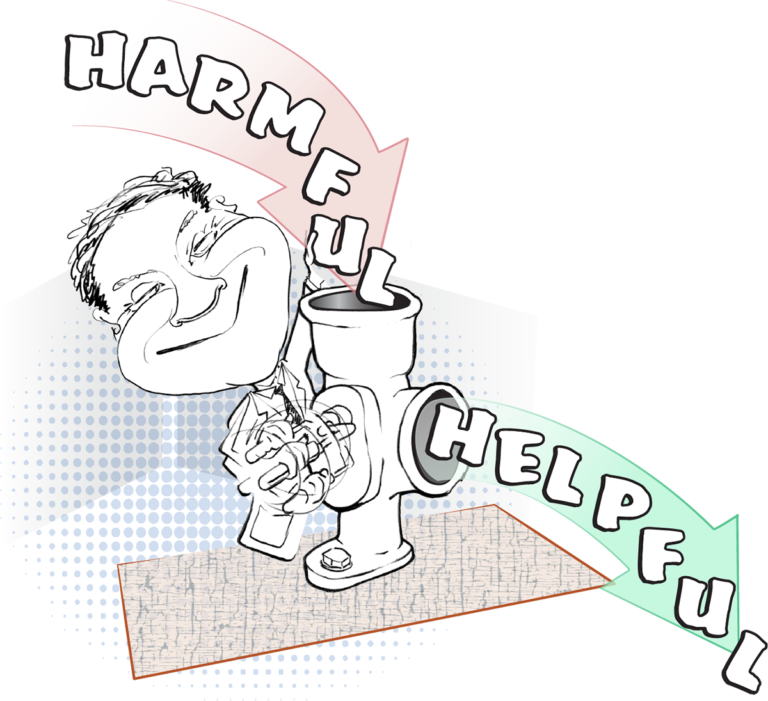Say you represent a company that makes a product people widely have negative opinions about. Luckily, you can come up with a different description of the product that makes it sound more positive:

(Illustration by IMS Senior Graphic Designer John Ilg)
- For example, your client is in the vaping industry, and you want jurors to think of vape pens in a positive light. To accomplish this, you might describe vaping as “healthy” or call a vape pen a “smoking cessation device”—despite the fact that the cartridge at issue contains nicotine.
- Perhaps your client used asbestos in its product, so you use the phrase “insulation material” rather than “asbestos.”
- If your client manufactures dieting pills, you may decide to refer to its product as “medicine”; after all, jurors’ definition of a medicine is most likely something that heals the body, like antibiotics.
These are clever uses of reframing to get jurors to think about the product from a different perspective, right? Not so fast. Yes, framing is key when strategizing how to best persuade jurors. However, there are other factors to consider that may be at odds with how one relabels a product or concept: reactance, perceived deception, and source credibility.
For a product such as a vape pen, the public is more aware of the fact that its users still receive the negative effects of nicotine, that nicotine use among teens has been on the rise due to vaping, and that harmful effects may not yet be known because it is a new product. Thus, if an attorney refers to a vape pen as a “smoking cessation device,” jurors who are aware that vaping can create an addiction to nicotine will not be persuaded by this reframing. Likewise, a company referring to asbestos as “insulation material” will likely not get jurors to perceive it in a less negative light, given how well known it is as a cancer-causing substance. Ultimately, such reframing may backfire.
So, before you move forward with a particular framing, ask yourself: How aware are jurors or the community of the product/concept? Have jurors been personally, negatively affected by it? Have jurors already formed an opinion due to media exposure or personal experience? Based on these answers, you should consider how your reframing will influence the factors known to affect jurors’ attitudes.
Overt Persuasion Attempts Can Cause “Reactance”
When people realize that someone is trying to persuade them to make a certain choice, they feel like the speaker is attempting to restrict their freedom of choice to the decision for which the speaker is advocating. The result of this perception is something called psychological “reactance.”
Put simply, people don’t like when they can tell someone is trying to influence them; “reactance” is that negative feeling they get when they perceive their freedom to choose is taken away. And what’s problematic about this is that one way for people to combat reactance is to act in opposition to the perceived forced choice—which, in this case, would be to find against your client.
So yes, persuasion is important—and expected—at trial, but calling overt attention to your attempts will put jurors on their guard. Relabeling a well-known product or concept in an inconsistent way from jurors’ perception is a surefire way to remind jurors that you’re trying to persuade them.
Perceived Deception Will Damage the Speaker’s Credibility
Moreover, if jurors believe you are referring to a product as something it’s not in your effort to persuade them, they will feel like you are trying to deceive them.
When jurors detect deception (whether they’re correct or not), they will become biased against the source of the message. If an attorney refers to a vape pen as a “smoking cessation device,” jurors may become biased against that attorney. In the Journal of Marketing Research, Peter Darke and Robin Ritchie note that this is problematic because it will make the audience defensive towards the speaker, not only in that moment but beyond; that is, not only will jurors have an immediate negative reaction toward the speaker, but it can cause a lasting bias against them.1
Reframing a product with a new label isn’t worth it if jurors will end up discounting your arguments.
Less Source Credibility = Less Persuasion (Bad News for You, Worse News for Your Expert Witnesses)
The more credibility a party has, the more persuasive they are. That’s common sense. In Communication and Persuasion, Carl Hovland, Irving Janis, and Harold Kelley show that there are two predominant factors that affect a source’s credibility: trustworthiness and expertise.2 And while jurors will disapprove of perceived deception when it comes out of an attorney’s mouth, the even greater damage that can be done here is if it comes from your expert witnesses.
To jurors, experts are supposed to be a (relatively) neutral, highly trained source of information. They’re bringing their expertise—and therefore they have a head start on bolstering the credibility of your case. So, it’s one thing to have your expert incorporate your case themes (a good thing!) and quite another to have them use deceptive phrasing that risks destroying the credibility they hold as an expert.
Final Thoughts
You can see how reframing something in a more flattering light can backfire. However, this all depends on if jurors know the product/concept and if they have a negative opinion of it. If jurors come in with a negative opinion of your client’s product, it is best to call it what it is and avoid creating an uphill battle for yourself. If that’s not the case, then reframing the product in a positive way can be beneficial to your client.
Therefore, if you’re considering using a framing tactic in your case, you’ll want to examine what the community thinks about the subject at hand. A focus group or community attitude survey, for instance, can be helpful for discovering the opinions your jurors will likely hold and whether reframing will help or hurt your case.
References
1 Darke, P., Ritchie, R. The Defensive Consumer: Advertising Deception, Defensive Processing, and Distrust. Journal of Marketing Research (2007).
2 Hovland, C., Janis, I., & Kelley, H. Communication and Persuasion (1953).
View this article on The National Law Review here: How Reframing an Argument to a Jury Can Create Backlash (natlawreview.com)








